
Extenuating circumstances

This page will guide you through your options for extenuating circumstances (or ECs for short), how to apply and where to go for additional support should you need it.
What is an extenuating circumstance?
During the course of your studies you may experience unforeseen exceptional circumstances that temporarily impair your ability to participate in your programme, submit your assessments or attend examinations or other assessment-related events such as an in-semester test or a performance.
It is important that you read all the information on this page before making an application, as well as the full regulations for ECs. You can also find key support contacts if you are considering an application – we are here to help you if you need us.
Extenuating circumstances are not a replacement for getting additional support. If you think you are experiencing ongoing issues that are impacting your studies, please seek support as soon as possible.
What are the valid grounds for extenuating circumstances?
The Regulations for extenuating circumstances set out the grounds on which the University accepts requests for ECs, including those that are supported by evidence or self-certified, and the possible outcomes of consideration of these applications.
We’re your Union Advice team and we’re here to tell you what counts as an EC
If you need to check whether you are eligible for self-certifying of your valid ECs, please contact MySurrey Hive.
Types of extenuating circumstances
There are two types of extenuating circumstances - self-certified and evidenced.
You will see the phrase "University working days" used in the below. This means Monday to Friday, excluding Bank Holidays and University closure days. You can find an up-to-date list of closure days on the key dates page.
Important information before applying
Before applying it is strongly recommended that you first discuss this with your personal tutor/Student Success Coach or MySurrey Hive to ensure you fully understand the implications of this process for your circumstances.
It is a very serious disciplinary offence to misuse this process and/or mislead the University. This could result in the termination of your programme in accordance with the Student Disciplinary Regulations. If you are unsure about the requirements, please seek advice from yourpersonal tutor/Student Success Coach, MySurrey Hive or the Students’ Union.
The submission of ECs applications, especially for several assessments, could affect your academic progression and potentially lead to your programme suspension and retaking a year. Once the application for ECs is approved by the University, any submitted work that is covered by this application, will not be marked.
If you are planning to apply to the Graduate Route (Post-Study Work Visa) then we would recommend that you contact MySurrey Hive.
We’re your Union Advice team and we’re here to tell you what counts as evidence
How to apply for extenuating circumstances
If you believe that you have valid ECs, then you must complete the application form online and submit it as soon as you become aware of the situation – but not more than 2-3 weeks before the deadline as circumstances may change during that time.
Please ensure that you specify if are requesting a deferral of your assessment(s) rather than an extension.
If you then decided to take the assessment or submit your work, you must withdraw your approved or pending application prior to the assessment/deadline, otherwise your work will not be marked even if you complete your assessment and submit it.
Submit an application on Surrey Self-Service
Applications are normally processed within five working days. If you have submitted the required evidence and have not heard by that time please contact MySurrey Hive.
Additional support for applicants
In addition to seeking support from your personal tutor/Student Success Coach or MySurrey Hive team, you may wish to contact the Students' Union who can offer impartial advice to all students.
The Centre for Wellbeing can also provide you with appropriate wellbeing support, including supporting evidence depending on your circumstances.
If you plan to apply to the Graduate Route (Post-Study Work Visa), we recommend contacting MySurrey Hive to understand the implications that submitting ECs may have on your eligibility for this visa.
How to withdraw an application
Sometimes circumstances change and you are able to complete or attend your assessment by the original date and time. If this is the case, you can request to withdraw part or all of your application – as long as you request it before the start of your assessment or deadline.
